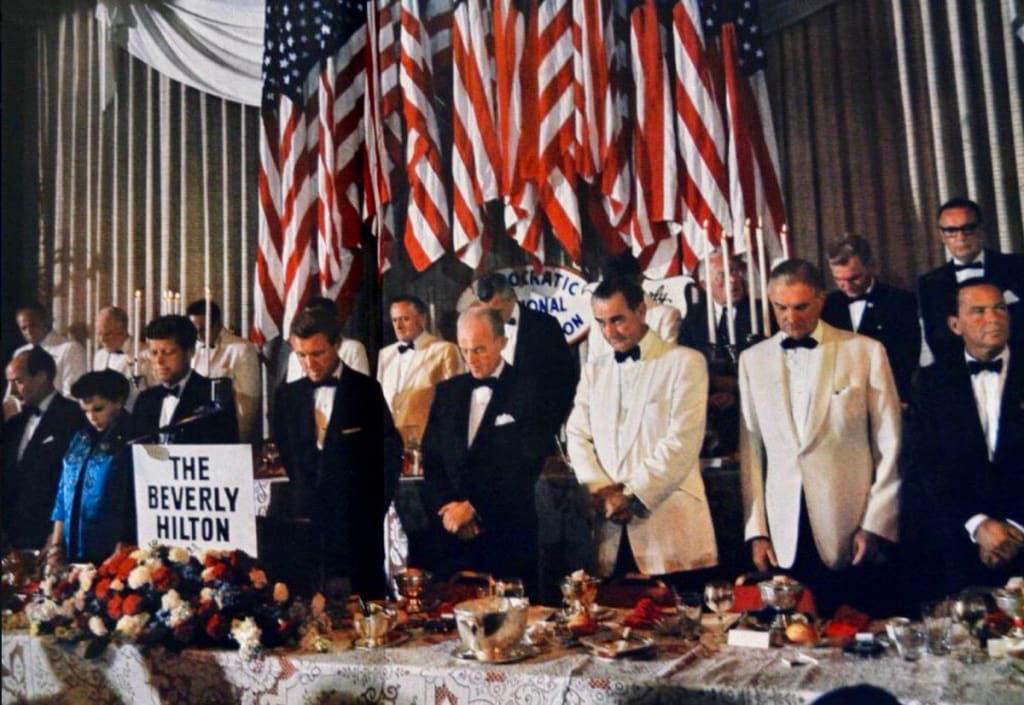The Camelot Era
Democratic Conventions 1960-1964

The 12th in a 20 part series on the Democratic National Conventions
1960: The New Frontier
Dates: July 11 - 15, 1960
Venue 1: Los Angeles Memorial Sports Arena, 3939 South Figueroa Avenue, Los Angeles. Ironically, the building was christened by Richard Nixon in 1959. It was demolished in 2016 and is now the site of Banc of California Stadium.
Venue 2: Los Angeles Memorial Coliseum, 3911 South Figueroa Street, Los Angeles. Built in 1922, the Coliseum is where Kennedy gave his acceptance speech. It was the site of the 1932 and 1984 Olympic games as well as the first Superbowl.
Events: The fight for the nomination was between Senator John F Kennedy of Massachusetts and Senate Majority Leader Lyndon Johnson of Texas. Kennedy won a slight majority on the first ballot, 806 against 409 for LBJ. Kennedy can thank his brother Robert’s political skills for putting him over the top.
While Kennedy didn’t like Johnson, he calculated that Johnson would be helpful in the South, especially Texas, so he offered him the Vice Presidential nomination. Delegates approved Johnson by acclamation.
Kennedy was the first Senator since 1920 to be nominated for President, and only the second Roman Catholic candidate in US history (Al Smith in 1928 had been first).
Civil Rights was a major issue at the convention, and a young State Senator from Hawaii, Patsy Mink, would make a national name for herself defending civil rights. Mink was elected to Congress in 1964.
Celebrity Watch: Kennedy’s brother in-law Peter Lawford brought along Rat Pack buddies Frank Sinatra and Sammy Davis. Jr. Tony Curtis and Janet Leigh also added to the Hollywood glamour.
Election 1960: Kennedy went head to head with Vice President Richard Nixon, and narrowly defeated him. His margin of just over 100,000 votes out of 68 million cast was one of the smallest in US history. Kennedy defeated Nixon more handily in the electoral college, 303 to 219, winning New York, Pennsylvania, Illinois and Texas. Kennedy would be assassinated in November 1963, making Johnson the 36th President.
1964: Pay No Worship to the Garish Sun
Dates: August 24 - 27, 1964
Venue: Boardwalk Hall, 2301 Boardwalk, Atlantic City NJ. Built in 1929, Boardwalk Hall remains a major convention venue. It is the home of the Miss America Pageant. It is a National Historic Landmark, partly because it contains the world’s largest pipe organ.
Events: In the wake of the assassination of John F Kennedy, Democrats rallied around Lyndon Johnson and voted to nominate him by acclamation. Johnson chose Minnesota Senator Hubert Humphrey to be his running mate and the convention approved that idea by acclamation as well.
One of the most poignant moments at the convention was when Attorney General Robert Kennedy introduced a film about his brother. Kennedy was greeted with 22 minutes of continuous applause, and then gave a moving eulogy about Jack. He ended by quoting Romeo and Juliet.
Civil Rights was once again a major issue at the convention. President Johnson had signed the Civil Rights Act into law only a few weeks before. Fannie Lou Hamer would rise to prominence as one of the leaders of the Mississippi Freedom Democratic Party, which was challenging the racist policies of the regular state party. Southern Democrats threatened to bolt the convention (a pretty common thing for southerners at Democratic Conventions) if the Freedom Party delegation was seated. Johnson, seeking unity, offered the Freedom Party delegates two votes -- they rejected his offer. Ultimately, the racist Mississippi delegation left anyway, because they hated LBJ.
Election 1964: Lyndon Johnson had the good fortune of running against Arizona Senator Barry Goldwater, who had a penchant for saying crazy things. Johnson swamped Goldwater in one of the biggest landslides in history, winning with 61 percent of the vote, 43 million to 27 million. In the electoral college, Johnson won 486 to 52. Goldwater won only in the Deep South and his home state of Arizona.






Comments
There are no comments for this story
Be the first to respond and start the conversation.